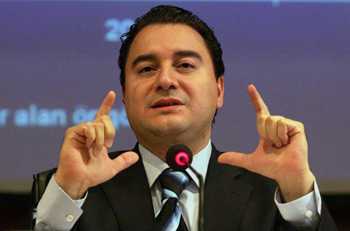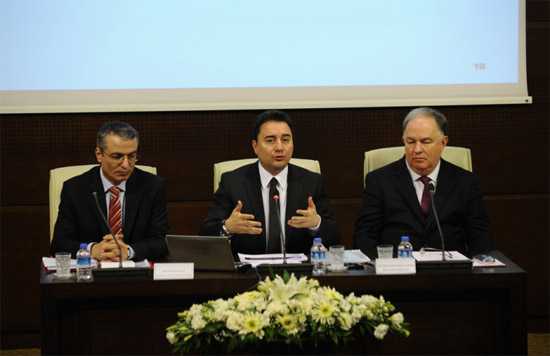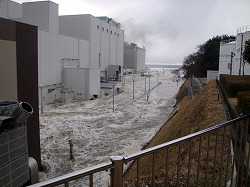Turkey’s Deputy Prime Minister Ali Babacan warned Friday that the US and Europe were not doing enough to resolve the core causes of the global economic slowdown.
By Mike Eckel, Contributor / April 28, 2012

The global economy remains deep in crisis and Europe and the United States are doing little to resolve its core causes, Deputy Turkish Prime Minister Ali Babacan warned Friday.
Mr. Babacan, a former foreign minister and Turkey’s point-man for economic policy, said neither the US nor the eurozone countries have yet to deal with the underlying causes of the global economic slowdown: a weak financial sector, weak corporate balance sheets, risky public financial positions.
Speaking at the Fletcher School of Law and Diplomacy at Tufts University, Babacan warned that this year will be a year of reckoning for the European Union, and he pointed to the recent collapse of the Dutch government over the budget austerity measures as a harbinger for Europe’s coming fiscal battles.
“2012 will be test year for European countries,” he said. “2013 will be test year for American economy. After the elections [the new administration] will find very difficult decisions on the table right away. There has to be serious fiscal adjustment and a medium term plan to deal with the deficit. So far, there is no credible plan to deal with deficit.”
Babacan said developed countries need to undertake serious structural changes including reforming social security and labor markets: “It is absolutely necessary for serious reforms, especially in many European countries, absolutely necessary and urgent.”
Babacan is a founding member of Prime Minister Recep Tayyip Erdogan’s Justice and Development Party and considered a leading member of the “Neo-Ottomanism” movement, moving Turkey’s foreign policy away from a predominantly Western focus to integration and activism in its immediate neighborhood – the territories of the former Ottoman Empire.
Babacan contrasted the Western economic turmoil, with Turkey’s booming economy which he said grew at 9.2 percent growth rate in 2010, and 8.5 percent in 2011.
“We entered this crisis with a strong banking system and strong public financial structure. During the crisis when many countries were asking for fiscal stimulus programs.… We followed a very different route. We did just the opposite. We announced fiscal consolidation program. And we overperformed,” he said.
He said Turkey’s economy was far more open than many European countries, which had made Turkish companies more dynamic and more competitive in global markets. And he argued that Turkish growth was more sustainable because he said it didn’t come on the back of government spending, but rather private sector growth.
In the coming years, he said, “We will have lower growth – though better than everywhere else in Europe – but slower than before. Growth is high, but it’s also sustainable growth.”
“Tight fiscal policies will continue, in good days or in bad days,” he said, “but we don’t believe in economic growth through public spending.”
Islam, democracy, and capitalism
Turkey has shown how Islam and democracy and capitalism can cooexist peacefully, Babacan said.
“When people observe a functioning example, people are more encouraged to ask for more in their own countries,” he said. “We have been talking with leaders: Change is coming, you can no longer have a closed regime with an open society – satellites, social media, the Internet – you have this kind, this kind of society moving forward and you are running this closed regime, this is not sustainable, this cannot continue.”
“We have advised these leaders to lead this change, or you will be pushed by change anyway,” he said.
Babacan addressed several of the long-running disputes in the region, such as the Israeli-Palestinian impasse, the status of the split island of Cyprus, and the violence in neighboring Syria. He said Turkey was strongly supportive of the six-point peace plan pushed by former United Nations Secretary General Kofi Annan, but he said Turkey was strongly against any sort of military intervention or sending weapons to the embattled Syrian opposition forces.
He also said the Syrian opposition is coalescing into a viable alternative to the regime of Syrian President Bashar al-Assad.
“We need to see visible, verifiable, and indisputable change in the country,” he said. “The primary responsibility to end the violence will rest with the Syrian regime.”
via Growing like gangbusters, Turkey says Western economies need ‘serious reforms’ – CSMonitor.com.




